

Green Brexit: a new era for farming, fishing and the environment. I want to thank Prosperity UK for organising this conference and in particular, Lord Hill of Oareford, Sir Paul Marshall and Alex Hickman who have been the dynamos who have ensured that today can occur.
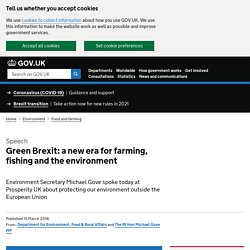
And they, like the team that run Prosperity UK, are determined to bring together individuals from across the political spectrum to develop policies for Britain’s future outside the European Union (EU). Precision approaches for sustainable soils - CHAP. Challenge: Agricultural production needs to increase by 60% by 2050 in order to feed the growing global population.
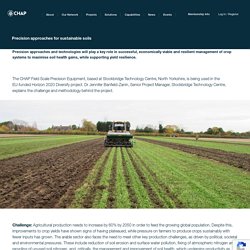
Despite this, improvements to crop yields have shown signs of having plateaued, while pressure on farmers to produce crops sustainably with fewer inputs has grown. The arable sector also faces the need to meet other key production challenges, as driven by political, societal and environmental pressures. These include reduction of soil erosion and surface water pollution, fixing of atmospheric nitrogen and recycling of unused soil nitrogen, and, critically, the management and improvement of soil health, which underpins productivity as well as environmental benefits.
Restoration of degraded grassland can benefit climate change mitigation and key ecosystem services - CABI.org. New research has demonstrated how, in contrast to encroachment by the invasive alien tree species Prosopis julifora (known as `Mathenge` in Kenya or `Promi` in Baringo), the restoration of grasslands in tropical semi-arid regions can both mitigate the impacts of climate change and restore key benefits usually provided by healthy grasslands for pastoralists and agro-pastoralist communities.
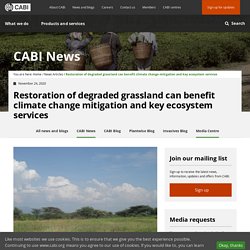
A team of Kenyan and Swiss scientists, including lead author Ms. Horticultural Research by Stockbridge Technology Centre. Agri-Tech Innovation Centre - Crop Health & Protection (CHAP) UK. Five new ways to find higher value from crop waste - CHAP. Yorkshire and the Humber host a world-class research base in a strongly agricultural region.
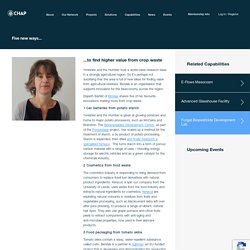
So it’s perhaps not surprising that the area is full of new ideas for finding value from agricultural residues. BioVale is an organisation that supports innovation for the bioeconomy across the region. A move towards precision farming will lead to an improved farm ecosystem - CHAP. The green revolution was ushered in by new chemistry, mechanisation and advances in plant breeding.
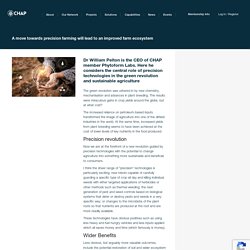
The results were miraculous gains in crop yields around the globe, but at what cost? The increased reliance on petroleum-based inputs transformed the image of agriculture into one of the dirtiest industries in the world. At the same time, increased yields from plant breeding seems to have been achieved at the cost of lower levels of key nutrients in the food produced. 25 Year Environment Plan. Our environment plan sets out our goals for improving the environment, within a generation, and leaving it in a better state than we found it.
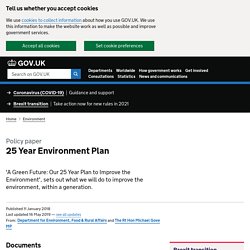
It details how we in government will work with communities and businesses to do this. It sets out what we will be doing over the next 25 years. Earthship Biotecture - Radically Sustainable Buildings. Buildinggreen news. Blogs - CHAP.
ENERGEIA. WÆTER. EORTHEN. BIOLOGIQUE. Forestimidible. Plastikos. Paper Facts 2017. Forestry carbon sequestration. Indonesia's Center for International Forestry Research and World Resources Institute - Climate Scorecard. Climate Change, Deforestation, Biomes and Ocean Currents, Plankton, Endangered Species - Earth Web Site. Click for more detail Thermohaline Change Evidence is growing that the thermohaline current may be slowed or stopped by cold fresh water inputs to the Arctic and North Atlantic oceans.

This could occur if global warming is sufficient to cause large scale melting of arctic sea ice and the Greenland ice sheet. 5 reasons why biodiversity matters to health and the economy. Biodiversity is critically important to human health, economies and livelihoods.
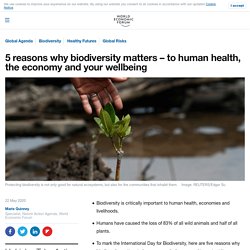
Humans have caused the loss of 83% of all wild animals and half of all plants. To mark the International Day for Biodiversity, here are five reasons why biodiversity matters to humans – and why we need to protect it. Biodiversity is critically important – to your health, to your safety and, probably, to your business or livelihood. Living Planet Report 2020. Online resources - CABI.org. Worldmapper: The world as you've never seen it before. Global risks: Interactive map shows climate issues rising. An overly simplistic view of global economics has fuelled climate denial and skepticism for decades.
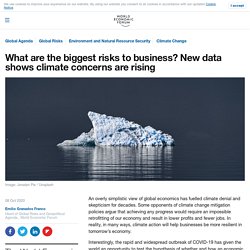
Some opponents of climate change mitigation policies argue that achieving any progress would require an impossible retrofitting of our economy and result in lower profits and fewer jobs. In reality, in many ways, climate action will help businesses be more resilient in tomorrow’s economy. Interestingly, the rapid and widespread outbreak of COVID-19 has given the world an opportunity to test the hypothesis of whether and how an economic shutdown might affect climate outcomes. Initial data suggests that 2020 annual emissions could decrease by as much as seven percent globally due to the downward shift in energy demand worldwide. The resulting short-term cooling effect could last until 2025, even as economies reopen and travel restrictions are lifted.
Climate change poses an urgent threat demanding decisive action. Contact us to get involved. Help Invasive Species Compendium. At CABI we’re focused on providing the best user experience we can, helping you find answers to your questions quickly, easily and accurately.
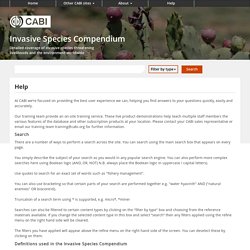
Our training team provide an on-site training service. These live product demonstrations help teach multiple staff members the various features of the database and other subscription products at your location. Please contact your CABI sales representative or email our training team training@cabi.org for further information. Search. ISC Overview. The ISC is an encyclopedic resource that draws together scientific information on all aspects of invasive species. It comprises detailed datasheets that have been sourced from experts, edited by CABI's scientific staff, peer-reviewed, enhanced with data from specialist organizations, and with images and maps, and linked to a bibliographic database. About the Invasive Species Compendium. The Invasive Species Compendium (ISC) is an encyclopedic resource that brings together a wide range of different types of science-based information to support decision-making in invasive species management worldwide. The US Department of Agriculture is a lead partner with CABI in the development of this Compendium which has been resourced by a diverse international Consortium of government departments, non-governmental organizations and private companies (further information is provided on this page).
The ISC could not have been produced without the collaboration of experts from around the world. MEDIALIST. The Global Risks Report 2020. For a list of shareable infographics, click here. For the 2020 Global Risks Report press release, click here. The 15th edition of the World Economic Forum’s Global Risks Report is published as critical risks are manifesting. The global economy is facing an increased risk of stagnation, climate change is striking harder and more rapidly than expected, and fragmented cyberspace threatens the full potential of next-generation technologies — all while citizens worldwide protest political and economic conditions and voice concerns about systems that exacerbate inequality.
The challenges before us demand immediate collective action, but fractures within the global community appear to only be widening. Stakeholders need to act quickly and with purpose within an unsettled global landscape. Global Risks Report 2020. Pay to view. BIOS. NUTRIRE. SCIENTIA. Cross Quarter. WEATHERED. Earthships. Accountability Framework. AEDIFICATIO. EORTHE. Ethice. INGENIARE. OIKONOMIA Cher. PLATEA. JUST BEAUTIFUL.